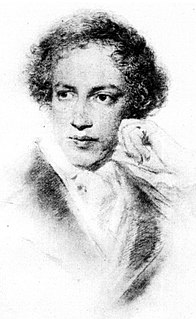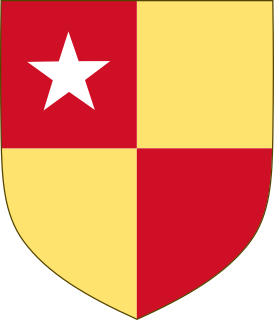Alexander Balloch Grosart was a Scottish clergyman and literary editor. He is chiefly remembered for reprinting much rare Elizabethan literature, a work which he undertook because of his interest in Puritan theology.

Earl of Essex is a title in the Peerage of England which was first created in the 12th century by King Stephen of England. The title has been recreated eight times from its original inception, beginning with a new first Earl upon each new creation. Possibly the most well-known Earls of Essex were Thomas Cromwell, chief minister to King Henry VIII, and Robert Devereux, 2nd Earl of Essex (1565–1601), a favourite of Queen Elizabeth I who led the Earl of Essex Rebellion in 1601.

Robert Dodsley was an English bookseller, poet, playwright, and miscellaneous writer.
This article contains information about the literary events and publications of 1646.
Cyril Tourneur was an English soldier, diplomat and dramatist who wrote The Atheist's Tragedy ; another play, The Revenger's Tragedy (1607), formerly believed to be by him, is now more generally attributed to Thomas Middleton.

Sir John Suckling was an English poet, prominent among those renowned for careless gaiety and wit – the accomplishments of a Cavalier poet. He also invented the card game cribbage. He is best known for his poem "Ballade upon a Wedding".

Roden Berkeley Wriothesley Noel, also known as Noël, was an English poet. He was a Cambridge Apostle.

Duke of St Albans is a title in the Peerage of England. It was created in 1684 for Charles Beauclerk, 1st Earl of Burford, then fourteen years old. King Charles II had accepted that Burford was his illegitimate son by Nell Gwyn, an actress, and awarded him the Dukedom just as he had conferred the Dukedoms of Monmouth, Southampton, Grafton, Northumberland and Richmond and Lennox on his other illegitimate sons.

Johannes Carsten Hauch was a Danish poet.

Francis Beaumont was a dramatist in the English Renaissance theatre, most famous for his collaborations with John Fletcher.

Charles Beauclerk, 1st Duke of St Albans, KG was an illegitimate son of King Charles II of England by his mistress Nell Gwyn.

Jean François Victor Aicard was a French poet, dramatist and novelist.

Hedingham Castle, in the village of Castle Hedingham, Essex, is arguably the best preserved Norman keep in England. The castle fortifications and outbuildings were built around 1100, and the keep around 1140. However, the keep is the only major medieval structure that has survived, albeit less two turrets. The keep is open to the public.

Aubrey Thomas de Vere was an Irish poet and critic.
Robert Davenport was an English dramatist of the early seventeenth century. Nothing is known of his early life or education; the title pages of two of his plays identify him as a "Gentleman," though there is no record of him at either of the two universities or the Inns of Court. Scholars have guessed that he was born c. 1590; if, as some scholars think, he wrote the Address "To the knowing Reader" in the first quarto of King John and Matilda, he was still alive in 1655. He enters the historical record in 1624, when two of his plays were licensed by the Master of the Revels.

Aubrey de Vere, 1st Earl of Oxford was an English noble involved in the succession conflict between King Stephen and Empress Matilda in the mid-twelfth century.

Robert de Vere, 5th Earl of Oxford was the son and heir of Hugh de Vere, 4th Earl of Oxford, and chamberlain to Queen Eleanor.

The House of de Vere were an English aristocratic family who derived their surname from Ver, in Lower Normandy, France. The family's Norman founder in England, Aubrey (Albericus) de Vere, appears in Domesday Book (1086) as the holder of a large fief in Essex, Cambridgeshire, Huntingdonshire, and Suffolk. His son and heir Aubrey II became Lord Great Chamberlain of England, an hereditary office, in 1133. His grandson Aubrey III became Earl of Oxford in the reign of King Stephen, but while his earldom had been granted by the Empress Matilda and eventually recognised by Stephen, it was not until January 1156 that it was formally recognised by Henry II and he began to receive the third penny of justice from Oxfordshire.
Sir Aubrey (Hunt) de Vere, 2nd Baronet was an Anglo-Irish poet and landowner.












